|
 Secure Site
Secure Site
|
 |
Archive for the 'Chime Alarm Clocks' Category
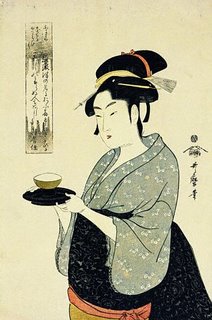 Kitagawa Utamaro Ukiyo-e, wabi-cha Wabi-cha, or wabi-tea, is a style of Japanese Tea Ceremony particularly associated with Sen no Rikyu and Takeno Joo before him. Wabi-cha emphasizes simplicity. The term came into use in the Edo era (1603 to 1868), prior to which it was known as wabi-suki, suki generally referring to the concept of “artistic inclination,” and “wabi” literally meaning ‘forelorn’.
adapted from wikipedia.org
 Zen Chime Clock with Japanese Maple Leaves in Honey Finish Now & Zen
1638 Pearl St.
Boulder, CO 80302
Posted in Bamboo Chime Clocks, Chime Alarm Clocks, Japanese Inspired Zen Clocks, Meditation Timers, Meditation Tools, mindfulness practice, Natural Awakening, Now & Zen Alarm Clocks, Progressive Awakening, Yoga Timer, Yoga Timers by Now & Zen, Zen Timers
 yugen, a profound mysterious sense of the beauty of the universe Yūgen is an important concept in traditional Japanese aesthetics. The exact translation of the word depends on the context. In the Chinese philosophical texts the term was taken from, yūgen meant “dim”, “deep” or “mysterious”. In the criticism of Japanese waka poetry, it was used to describe the subtle profundity of things that are only vaguely suggested by the poems, and was also the name of a style of poetry (one of the ten orthodox styles delineated by Fujiwara no Teika in his treatises).
Yugen suggests that beyond what can be said but is not an allusion to another world. It is about this world, this experience. All of these are portals to yugen:
“To watch the sun sink behind a flower clad hill. To wander on in a huge forest without thought of return. To stand upon the shore and gaze after a boat that disappears behind distant islands. To contemplate the flight of wild geese seen and lost among the clouds. And, subtle shadows of bamboo on bamboo.”
Zeami Motokiyo
Yugen is said to mean “a profound, mysterious sense of the beauty of the universe… and the sad beauty of human suffering”.
adapted from wikipedia.org
 Japanese Maple Leaves Dial Face, the Zen Alarm Clock for a progressive awakening Now & Zen
1638 Pearl Street
Boulder, CO 80302
Posted in Bamboo Chime Clocks, Chime Alarm Clocks, Goodness, Meditation Timers, Meditation Tools, mindfulness practice, Natural Awakening, Now & Zen Alarm Clocks, Progressive Awakening, wabi-sabi, Zen Timers
 plum blossoms, one of the four noble gentlemen The “Four Gentlemen”, also called the Four Noble Ones or Four Friends, in Chinese art refers to four plants: the orchid, or ran; the bamboo; the chrysanthemum, or kiku; and the plum blossom, or ume (italics are in Japanese). The term compares the four plants to Confucianist junzi, or “gentlemen”. A painting or decoration incorporating all four plants is also known as the “Four Gentlemen”. They are most typically depicted in traditional ink and wash painting. The “Four Gentlemen” belong to the category of bird-and-flower painting in Chinese art.
The Four Gentlemen have been used in Chinese painting since the time of the Chinese Song Dynasty (960–1279) because of their refined beauty, and were later adopted by artists in Korea, Japan, and Vietnam. As they represent the four different seasons (the plum blossom for winter, the orchid for spring, the Chrysanthemum for autumn, and the bamboo for summer), the four are used to depict the unfolding of the seasons through the year.
adapted from wikipedia.org
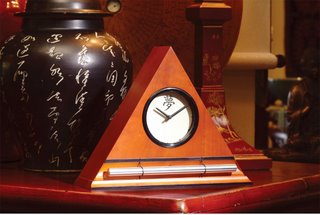 Zen Alarm Clock with Chime and Dream Kanji Dial Face Now & Zen
1638 Pearl Street
Boulder, CO 80302
Posted in Bamboo Chime Clocks, Chime Alarm Clocks, Japanese Inspired Zen Clocks, Meditation Tools, mindfulness practice, Natural Awakening, Now & Zen Alarm Clocks
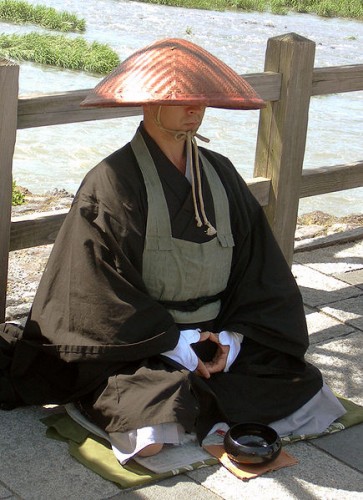 zen monk The term mendicant refers to begging or relying on charitable donations, and is most widely used for religious followers or ascetics who rely exclusively on charity to survive.
In principle, medicant orders or followers do not own property, either individually or collectively, and have taken a vow of poverty, in order that all their time and energy could be expended on practicing or preaching their religion or way of life and serving the poor.
Many religious orders adhere to a mendicant way of life, including the Catholic mendicant orders, Hindu ascetics, some dervishes of Sufi Islam, and the monastic orders of Janism and Buddhism. In the Catholic Church, followers of Saint Francis of Assisi and Saint Dominic became known as mendicants, as they would beg for food while they preached to the villages.
adapted from wikipedia.org
 Digital Zen Alarm Clocks, available in maple, walnut, bamboo, and black lacquer Now & Zen
1638 Pearl Street
Boulder, CO 80302
Posted in Bamboo Chime Clocks, Chime Alarm Clocks, Natural Awakening, Now & Zen Alarm Clocks, prayer, Progressive Awakening, Yoga Timers by Now & Zen
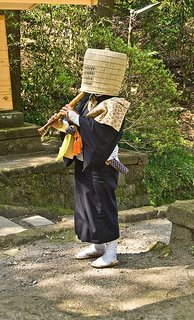 A Buddhist monk begging as a komusō A komusō, was a Japanese begging monk of the Fuke school of Zen Buddhism, during the Edo period of 1600-1868. Komusō were characterised by the straw basket (a sedge or reed hood named a tengai) worn on the head, manifesting the absence of specific ego. They are also known for playing solo pieces on the shakuhachi (a type of Japanese bamboo flute).
These pieces, called honkyoku (“original pieces”) were played during a meditative practice called suizen for alms, as a method of attaining enlightenment, and as a healing modality. The Japanese government introduced reforms after the Edo period, abolishing the Fukè sect. Records of the musical repertoire survived, and are being revived in the 20th century.
adapted from wikipedia.org
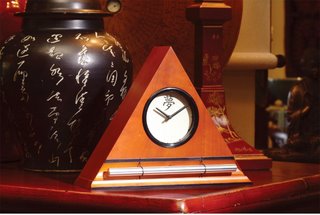 Kanji Dial Face in Honey Finish, Zen Alarm Clocks with a progressive chime
Now & Zen
1638 Pearl Street
Boulder, CO 80302
Posted in Chime Alarm Clocks, Japanese Inspired Zen Clocks, Meditation Timers, Meditation Tools, mindfulness practice, Natural Awakening, Now & Zen Alarm Clocks, zen monks
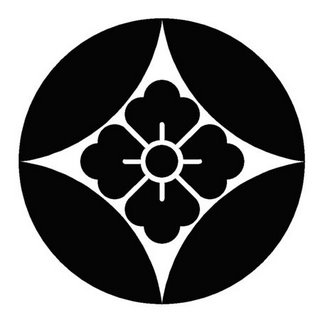 Hana Wachigai, the crest of the Izumo Genji clans (Oki, Enya, Takaoka) Mon, also monshō, mondokoro, and kamon, are Japanese heradic symbols. Mon may refer to any symbol, while kamon and mondokoro refer specifically to family symbols.
There are no set rules in the design of a mon. It most commonly consists of a roundel encircling a figure of plant, animal, man-made, natural or celestial objects, all abstracted to various degrees.
Religious symbols, geometric shapes and kanji were commonly used as well. Virtually all modern Japanese families have a mon, though modern usage is rare. Many Japanese may no longer recognize their own family’s mon.
adapted from wikipedia.org
 Zen Chime Alarm Clock, Digital Black Lacquer by Now & Zen Now & Zen
1638 Pearl Street
Boulder, CO 80302
(800) 779-6383
Posted in Beauty, Chime Alarm Clocks, Japanese Inspired Zen Clocks
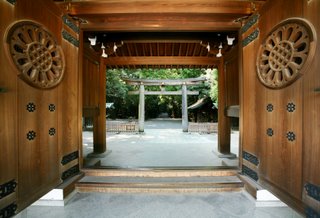 torii gate, Meiji-jingu Shrine, Japan A torii is a traditional Japanese gate most commonly found at the entrance or within a Shinto shrine, where it symbolically marks the transition from the sacred to the profane. The presence of a torii at the entrance is usually the simplest way to identify Shinto shrines, and a small torii icon represents them on Japanese road maps. They are however a common sight at Japanese Buddhist temples too, where they stand at the entrance of the temple’s own shrine, called chinjusha and usually very small.
adapted from wikipedia.org
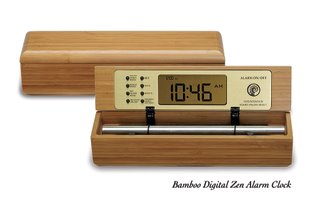 Bamboo Zen Timers, a meditation tool Now & Zen
1638 Pearl Street
Boulder, CO 80302
Posted in Bamboo Chime Clocks, Chime Alarm Clocks, Japanese Inspired Zen Clocks, Yoga Timer, Zen Timers
 calm the mind, zen timers by Now & Zen, Boulder, CO In Medtitation everyone most likely experiences two of the five hindrances. They are boredom, which is half-hearted action with little or no collectedness and restlessness-worry, which is the inability to calm the mind.
The first three enlightment factors (mindfulness, investigation, energy) are to be used when experiencing boredom to regain collection, the last three enlightment factors (tranquillity, collection, equanimity) are to be used when experiencing restlessness and worry to regain collectedness.
adapted from wikipedia.org
 Bamboo Zen Timers, a meditation tool Now & Zen
1638 Pearl Street
Boulder, CO 80302
(800) 779-6383
Posted in Bamboo Chime Clocks, Chime Alarm Clocks, Japanese Inspired Zen Clocks, Meditation Timers, Meditation Tools, mindfulness practice, Natural Awakening, Now & Zen Alarm Clocks, Yoga Timer, Yoga Timers by Now & Zen
 Chrysanthemum Flower The Imperial Seal of Japan is a crest used by members of the Japanese Imperial family. The Emperor of Japan, used a 16 petal chrysanthemum with sixteen tips of another row of petals showing behind the first row.
Shinto shrines either displayed the imperial seal or incorporated elements of the seal into their own emblems.
Shinto is the natural spirituality of Japan and the Japanese people. The word Shinto (“Way of the Gods”) was adopted from the written Chinese combining two kanji: “shin” meaning gods or spirits (originally from the Chinese word shen); and “tō“, or “do” meaning a philosophical path or study (originally from the Chinese word tao).
Modern Shinto does have a central theological authority but no singular Theocracy.
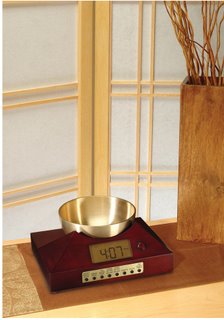 Zen Timepiece, a bowl/gong alarm clock and timer in cherry finish adapted from wikipedia.org
Now & Zen Headquarter Store
1638 Pearl Street
Boulder, CO 80302
Posted in Chime Alarm Clocks, Meditation Timers, Meditation Tools, Now & Zen Alarm Clocks
« Previous Page — « Previous Entries
Next Entries » — Next Page »
|
|
|
|